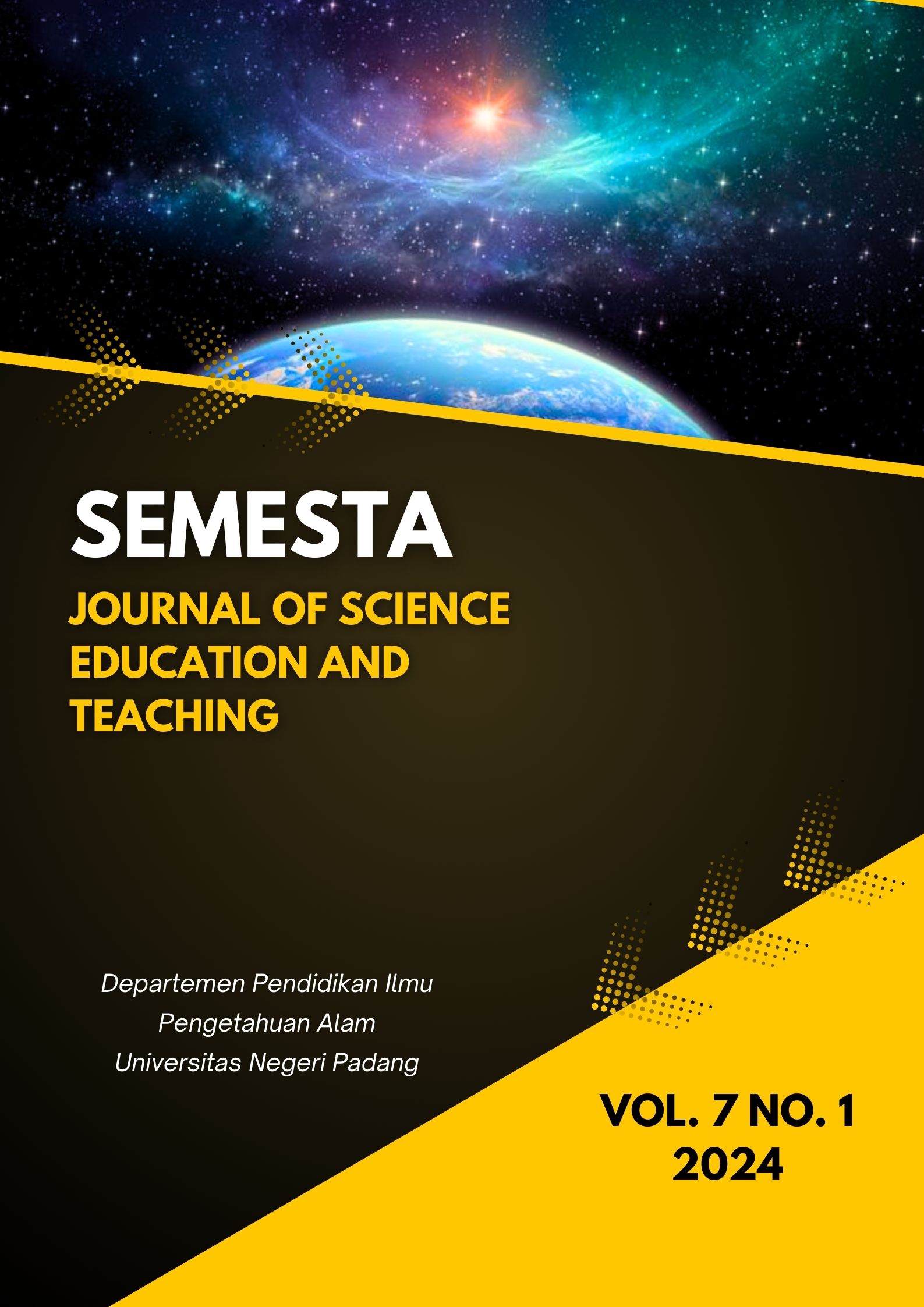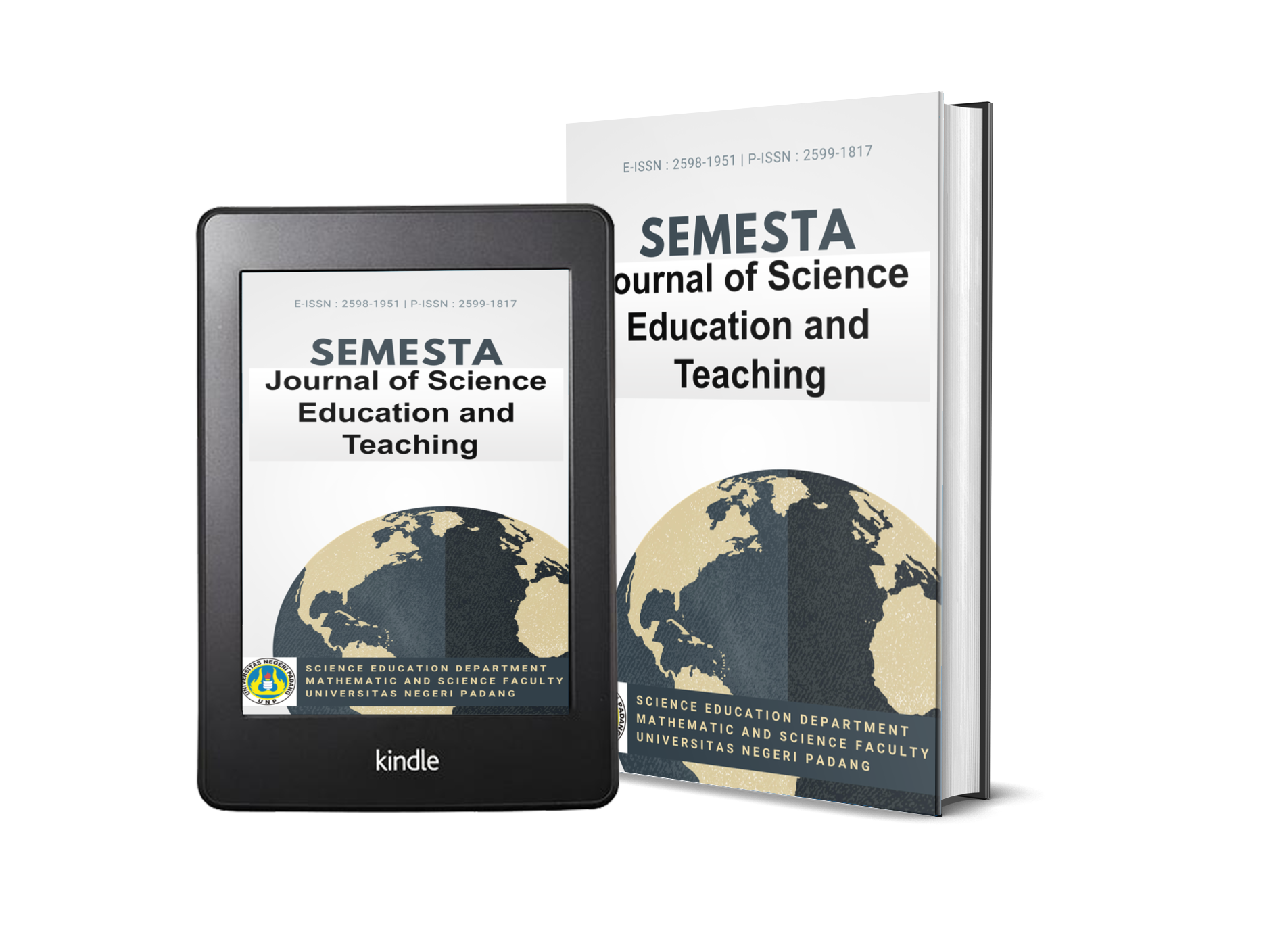JUNIOR HIGH SCHOOL STUDENTS' PERCEPTIONS OF PROBLEM BASED LEARNING MODEL IN SCIENCE LEARNING
DOI:
https://doi.org/10.24036/semesta/vol7-iss1/267Keywords:
Students’ perception, problem based learning, science teachingAbstract
Problem Based Learning (PBL) is a learning approach that is often used in education in recent years. The purpose of this article is to find out how junior high school students perceive PBL model in science class and the benefits of PBL model in science learning. To find data related to junior high school students' perceptions of problem-based learning models in science classes, the researcher conducted a systematic review of several relevant sources with a period from 2014 to 2023, following the principles of Preferred Reporting Items for Systematic Reviews and Meta-Analyses (PRISMA). Based on the research results, it is known that the problem solving ability of students who learn using the PBL model is better than students who learn with conventional models. The results of this study prove PBL as an effective learning method for science compared to conventional teaching methods. PBL method is perceived to improve students' knowledge and communication skills. Based on several research results that have been conducted, it can be concluded that the PBL model has a positive impact on learning.
References
Abdalla, M E. 2019. “Student Perception of the Effect of Problem Familiarity on Group Discussion Quality in a Problem-Based Learning Environment.” GMS Journal for Medical Education 36(3 PG-). https://doi.org/10.3205/zma001237.
Al-Drees, A. 2015. “Students’ Perception towards the Problem Based Learning Tutorial Session in a System-Based Hybrid Curriculum.” Saudi Medical Journal 36(3 PG-341–348): 341–48. https://api.elsevier.com/content/abstract/scopus_id/84924360839 NS -.
Argaw, Aweke Shishigu, Beyene Bashu Haile, Beyene Tesfaw Ayalew, and Shiferaw Gadisa Kuma. 2017. “The Effect of Problem Based Learning (PBL) Instruction on Students’ Motivation and Problem Solving Skills of Physics.” EURASIA Journal of Mathematics, Science & Technology Education 13(3): 857–71. https://doi.org/10.12973/eurasia.2017.00647a.
Boelt, A. M., A. Kolmos, and J. E. Holgaard. 2022. “Literature Review of Students’ Perceptions of Generic Competence Development in Problem-Based Learning in Engineering Education.” European Journal of Engineering Education (May). https://doi.org/10.1080/03043797.2022.2074819.
Das, M., D. J.S. Mpofu, M. Y. Hasan, and T. S. Stewart. 2002. “Student Perceptions of Tutor Skills in Problem-Based Learning Tutorials.” Medical Education 36(3): 272–78. https://doi.org/10.1046/j.1365-2923.2002.01148.x.
Jaeger, M. 2014. “The Influence of Students’ Interest, Ability and Personal Situation on Students’ Perception of a Problem-Based Learning Environment.” European Journal of Engineering Education 39(1 PG-84–96): 84–96. https://api.elsevier.com/content/abstract/scopus_id/84893803774 NS -.
Kong, A. 2014. “Students’ Perceptions of Using Problem-Based Learning (PBL) in Teaching Cognitive Communicative Disorders.” Clinical Linguistics and Phonetics 28(1 PG-60–71): 60–71. https://api.elsevier.com/content/abstract/scopus_id/84893096970 NS -.
Oderinu, Olabisi H, Ilemobade C Adegbulugbe, Omolola O Orenuga, and Azeez Butali. 2020. “Comparison of Students’ Perception of Problem-Based Learning and Traditional Teaching Method in a Nigerian Dental School.” European journal of dental education : official journal of the Association for Dental Education in Europe 24(2 PG-207–212): 207–12. NS -.
Sumiantari, N L. Eka, I Nyoman Suardana, and Kompyang Selamet. 2019. “Pengaruh Model Problem Based Learning Terhadap Kemampuan Pemecahan Masalah Ipa Siswa Kelas VIII Smp.” Jurnal Pendidikan dan Pembelajaran Sains Indonesia (JPPSI) 2(1): 12. https://doi.org/10.23887/jppsi.v2i1.17219.
Syamsyidah, and Hamidah Suryani. 2018. Buku Model Problem Based Learning ( PBL ).
Tagliabue, Giulia et al. 2021. “No Title.” Journal of Photogrammetry and Remote Sensing 187: 362–77. https://doi.org/10.1016/j.isprsjprs.2022.03.014.
Xu, Weiqi, and Fan Ouyang. 2022. “The Application of AI Technologies in STEM Education: A Systematic Review from 2011 to 2021.” International Journal of STEM Education 9(1).
Yustina et al. 2022. “The Effect of E-Learning Based on the Problem-Based Learning Model on Students’ Creative Thinking Skills During the Covid-19 Pandemic.” International Journal of Instruction 15(2): 329–48. https://doi.org/10.29333/iji.2022.15219a.

Downloads
Published
How to Cite
Issue
Section
License
Copyright (c) 2024 Febby Febriani, Muhammad Azki, Rani Oktavia

This work is licensed under a Creative Commons Attribution 4.0 International License.





